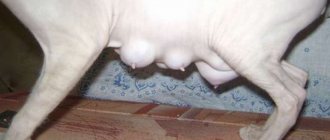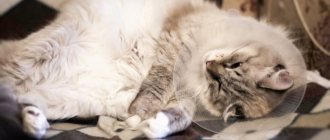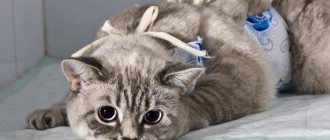If a cat tries to find sexual partners after sterilization and shows signs of estrus, you should immediately take your pet to the veterinarian. Atypical behavior may be the result of a poorly performed operation or serious illnesses caused by disruption of the endocrine glands. Treatment at home without visiting a veterinary clinic is impossible.
What can explain sexual desire after surgery?
Many cat owners decide to undergo a similar procedure for obvious reasons. Firstly, the sexual activity of animals is accompanied by loud screams that disturb the peace and sleep of the owners. Secondly, not all people enjoy the good emotions associated with the birth of babies. Having decided to undergo surgical intervention, many owners ask the question: “Does it happen that a cat asks for a cat after sterilization?” Unfortunately, such a situation is very likely. This happens for a number of reasons, the most common of which are:
- Poor quality of surgical intervention.
- Hormonal imbalances.
- Features of the development of the gonads.
Signs of sexual activity are usually present in females who have undergone surgery in adulthood. Symptoms are evidence of changes in hormone balance. Some time after surgery, behavior characteristic of the estrus period is observed. Watching their pet, the owners begin to understand that the cat, after sterilization, asks for a cat.
In principle, there is nothing “supernatural” about this. The reason is the same why unsterilized pets are “thirsty” for cats: hormones. In vain, many owners who have nothing to do with veterinary medicine believe that after sterilization, these substances disappear from the animal’s body instantly.
This is impossible for purely physiological reasons:
- Partial hormones always remain in the pet’s blood and plasma, and the “blood” reserves can last for a long time. For some cats, the process of hatching lasts for several months.
- In addition, hormones accumulate intensively in subcutaneous tissue and other fat reserves in the cat’s body. The more well-fed the pet was at the time of sterilization, the longer it will show “echoes” of typical sexual behavior. There are cases when a cat, which was operated on a year ago, begins to scream from time to time, clearly demanding the presence of the cat. This doesn’t happen too often, but this phenomenon is also not unique.
Of course, residual hormones are an important, but still not the only predisposing factor in the “strange” behavior of operated cats.
There are other reasons, although they are not too varied:
- Rarely, a kind of “replacement of functions” occurs in the body of the operated animal. The adrenal glands and other glands of a sterilized cat can also produce sex hormones. Even though the volumes of their synthesis are not so large, this amount is quite enough for the cat to start screaming and demanding “male attention.” True, in practice this phenomenon actually occurs infrequently, and the reserves of such hormones dry up relatively quickly. There simply aren’t enough of them for anything “serious.”
- An “exotic” case – during a carelessly performed operation, an ovary may remain in the animal’s body. Sometimes, during sterilization, the ovaries are deliberately left altogether, only the uterus being removed. Note that in the case of deprivation of old animals, this is completely justified, since the sudden deprivation of their body of sources of hormones is too much stress, the consequences of which are difficult to predict.
Finally, some veterinarians and zoologists believe that animals are guided only by instincts. Recent research shows that these animals are individuals in the full sense of the word, and therefore they are not alien to habits, including those that may seem strange to us.
Simply put, screams that seem to indicate the cat’s desire, in fact, may simply be a “habit”, an echo of the cat’s usual behavior. You should not pay attention to this: over time, the pet will get used to the new role, calm down, and the screaming will stop by itself.
When, after sterilization, the pet continues to ask for a cat, the following behavioral characteristics are observed:
- From time to time the animal seems to “wakes up” and begins to meow hoarsely, “invitingly”.
- Periods of sexual arousal in sterilized cats do not last long, ending suddenly just as they began.
- Another thing is much more unpleasant. The problem is that a sterilized cat often marks its territory, despite its “inferiority.” Alas, this habit remains with the pet for a long time, sometimes for the rest of its life.
We suggest you read: Microsporia in cats: treatment, symptoms, treatment at home Of course, you shouldn’t hope for its complete disappearance, but still, the stable amber gradually disappears (in about six months, sometimes it takes longer).
Pet stress
Moving, unfamiliar people in the house, new pets - all these reasons can cause stress in a cat. If the cat's reaction to changes manifests itself in the form of screams and meows, the owner will have to take measures to correct the animal's behavior. To adapt to new conditions, cats can be prescribed sedatives, as well as behavior correction courses aimed at socializing the animal.
When changing the cat's usual environment, it is important for the owner to pay attention to the pet's condition in order to minimize the manifestations of stress and help him avoid common behavioral problems.
To be calm about the health and emotional state of the pet, the owner must find the motives for meowing and understand why the cat yells for no apparent reason. Once the motives for the cat’s atypical behavior have been identified, the owner will be able to draw up a further action plan to eliminate meowing and improve the pet’s quality of life. Depending on the reasons for meowing, cats may be prescribed analgesics, herbal-based sedatives, hormonal pills and other remedies.
It is important for the owner to learn to interpret the signals sent by the cat and interact correctly with his pet. It is worth understanding that unreasonable aggression, scolding and instructive spanking on the part of the owner will not help overcome the animal’s feelings of anxiety and correct its behavior. On the contrary, inappropriate behavior of the owner can cause fear in the pet and provoke additional behavioral problems.
Sterilizing a cat is a fairly simple procedure and involves removing the ovaries. But care after surgery until complete healing should be good. If a cat screams after sterilization, you need to pay special attention and take action. Often, basic love and affection can solve a number of problems, but in some cases you cannot do without qualified help.
After sterilization, the cat screams and asks for a cat
It has been noted that a murka can scream after an operation has been performed, when the ovaries of an adult have been removed and the procedure has not been completed completely. Then her desires awaken again, she demands a cat and shows her character. If the cat meows for a long time after sterilization, it is necessary to show it again to the veterinarian, who will examine it and decide whether a second operation is needed. As a rule, after it the animal’s sexual desire fades away.
An adult cat after sterilization can scream for some time even if the ovaries are completely removed.
This is due to hormones that are produced not only by the ovaries, but also by the pituitary gland and adrenal glands. Hormonal levels can gradually stabilize. But sometimes it is necessary to administer special medications, otherwise your pet will be disturbed at night. Often only one injection is required, but sometimes repeated injections are required.
Worried about pain
There are rare cases where a sterilized cat may experience pain. Then she yells aggressively and thereby attracts the attention of the owners. This is a reason to immediately seek qualified medical help.
Problems that arise after sterilization
As already mentioned, pain and discomfort can be the cause of a sterilized cat’s cry. There are several reasons for this:
- Postoperative hernia . It occurs when the internal seam diverges. To understand whether your pet has developed a hernia after sterilization, it is enough to carefully palpate the abdomen. If you notice a lump, then it is likely that this is it. It occurs against the background of excessive activity of the animal or poorly performed surgery.
- Diarrhea or constipation . They often occur in the postoperative period and cause discomfort to the cat. Therefore, she can yell, informing the owner about her problems. In case of constipation, you will need to give laxatives recommended by your doctor. Also pay attention to nutrition, which will also help cope with the problem. If she has diarrhea, consult a veterinarian and serve congealed rice.
- Change in body temperature . It is usually possible to increase the temperature after anesthesia used during sterilization, then the pet screams pitifully. But, if it is observed for more than three days, then we can talk about a complication. A decrease in temperature may also be observed. In this case, try to keep the cat warm. If this situation drags on and is accompanied by general lethargy and refusal to eat, then immediately show it to the veterinarian.
Sleep disturbance
After surgery, sterilized individuals may experience sleep disturbances. Very often, after sterilization, a cat screams at night, demanding attention from its owners. Against the background of changing hormonal levels, changes in character may be observed. Be patient and do not punish the animal. Over time, the condition will normalize and she will stop yelling . If this pattern persists for a long time, discuss with your doctor the possibility of using sedatives.
The answer to the question of whether cats scream after sterilization is yes, but such cases are quite rare. Firstly, the body undergoes a restructuring, and secondly, problems may occur in the postoperative period. Show maximum attention and surround her with care.
New family member
The young owners of a luxurious Persian cat gave birth to a child. The pet always had a calm and kind disposition, was not problematic and visited her litter box regularly. And then they replaced her: she hides in all corners, she began to be capricious in her diet, and the worst thing is that the cat marks all the corners, including the children's room.
What should owners do in this situation? First of all, you need to know that this behavior is the pet’s reaction to the baby, oddly enough. Cats have difficulty withstanding any change of environment and the appearance of new faces on their territory. Over time, this behavior will pass. In this situation, all that remains is to punish the prankster by catching her at the crime scene.
We suggest you read: When is the best time to sterilize a cat? Age and optimal period
Signs that a cat is wandering
A cat in heat causes a lot of trouble to its owners. The average duration of a cat's heat is 5-7 days.
There are also temperamental individuals that can walk for 10-14 days every month. The first time a cat begins to ask for a male cat is at the age of 6 months, but this is too early for mating. The characteristic symptoms of estrus are immediately noticeable:
- friction of the pet against objects - often, for a long time;
- loud screams with inviting notes, often at night;
- more affectionate behavior with the owner and others;
- refusal of food (the cat may not even eat its favorite treats);
- frequent urination, especially if there is a cat nearby;
- when stroking the tail area, the animal protrudes its back part, twitches its tail, and bends its paws;
- clear fluid is discharged from the vagina.
Symptoms may vary between individuals. There are animals that walk almost unnoticed, and the owner finds out about the heat after pregnancy. But more often the first signs are pronounced.
What to do if the cat continues to walk?
First of all, the owner who notices signs of estrus in his cat should analyze the following points:
- how much time has passed since the operation;
- Could this be a reaction to the smell of valerian, catnip, etc.
Next, you need to contact a veterinary clinic, and it is advisable to choose a different one from where the operation was performed. It is necessary to take tests for hormones to determine whether they continue to be produced by the remnants of ovarian cells or other organs, and also do an ultrasound, which will indicate the presence of ovaries.
You will definitely need to make sure that the cause of hormone production is not a tumor; for this you will also need to undergo a series of examinations.
Solving the problem on your own with various pills that suppress estrus is not recommended. Often such drugs cause tumors and health problems.
Calm a cat at home
Experienced owners offer the following options for solving the problem of sexual hunting:
- lock the animal in a separate room (but this is not always suitable; often the cat experiences even more stress);
- during the period of activity, put the animal under water (preferably warm) for several minutes;
- distract your pet by playing: during the period of sexual activity, the cat experiences an excess of energy, which in nature it spends on searching for the cat and mating.
Be sure to read: Heat in cats: how long does it last and how often does it happen, at what age, how to recognize it, how the process proceeds
These methods help if one or two heats need to be missed, and in the future the cat is going to be mated with a male.
Herbal therapy is considered gentle and quite effective.
To calm a walking pet, people use:
- lemon balm;
- chamomile;
- mint;
- motherwort.
A decoction of these herbs, individually or as a complex, is given to the animal twice a day. These methods are considered the safest because they do not contain hormones. Hence the short duration of the impact.
If the offspring are not needed at all, then it is better to sterilize the animal. If the animal is active and folk remedies do not help, veterinary drugs are used.
They can act in different ways: change the animal’s hormonal levels, or simply have a calming effect. The form of release of such medications is very diverse: tablets, injections, suspensions, decoctions and even drops. Many veterinary drugs have side effects, especially when taken chronically.
Before use, you must carefully read the instructions and consult your doctor.
To calm a pet during estrus, veterinary medicine offers various medications.
The most popular means are:
- Kot Bayun is a water infusion of soothing herbs. Available in drops in bottles of 10-16 ml. The product is safe, has a calming and analgesic effect.
- Fospasim is a homeopathic medicine in drops. Helps your pet survive stress. It is used not only for calming while searching for a cat, but also when moving, before exhibitions and for easily excitable animals.
- Stop-intim is a hormonal drug that is recommended for use if you do not plan to get offspring from your cat.
- Stop-stress - effective drops of domestic production. Contains calming plant extracts & phenibut. The daily dose is 1 drop per 1 kg of weight. Divide into 2 doses.
Be sure to read: Depo-Provera for cats: instructions for use, dosage, injections for walking
Hormonal medications provide high-quality results, but if the strict dosage is not followed, they are harmful to the pet’s health.
Hormones
Sterilization does not disrupt hormone production. For this reason, the cat may go into sexual heat. The instinct to reproduce does not disappear, so the animal may go into heat. It is accompanied by changes in the behavior of the pet.
A cat can be in heat even after spaying, because... The ability to produce the necessary hormones is retained by the adrenal glands and the pituitary gland. For this reason, the operation is recommended to be performed at 6 months, i.e. before the onset of the first sexual heat.
To normalize the state of health, the cat is prescribed hormonal medications.
What actions will help relieve anxiety?
What to do if a cat goes on a spree worries all owners. You can use various methods to relieve anxiety during this period. To increase efficiency, it is better to use them comprehensively.
- Limit contact with other animals in the house.
Such actions will help avoid conflicts, because a cat’s character changes for the worse during heat. She can show aggression towards other cats, dogs and small animals.
A closet or bathroom is suitable for insulation. There must be clean water there. It is recommended to give food before bedtime and several small portions during the day.
The cat becomes aggressive. It is necessary to lay softer bedding made from natural fabrics. The cat will appreciate the comfort and nervous tension will decrease somewhat.
- Keeping the tray clean.
Cats are particularly clean even during estrus. Due to increased irritability, an uncleaned litter box can cause a negative reaction and the cat will shit in another place.
- Keep your cat busy with games and entertainment.
Excessive activity and energy need to be directed in the right direction. To do this, purchase new toys, and she will be busy for several days. Having played enough all day, she will sleep soundly.
What should pet owners do?
In order for your pet to calm down, you need to consult a specialist to select therapy.
We invite you to read: Sterilization of cats during estrus, what dangers exist
Today in pharmacies there is a large selection of medicines based on medicinal plants that help cope with the problem. Based on the examination results, the veterinarian will recommend the correct remedy for the animal. Fortunately, these drugs do not cause serious side effects.
Most likely, just be patient. Gradually the cat will calm down, nothing bad will happen to it. But what you definitely can’t do is give your pet hormonal sedatives, like Sex Barrier and similar drugs. The problem is that their long-term use during the action of animal hormones remaining in the blood is a sure path to the development of cancer.
To make your cat calmer, you can take the following actions:
- It is necessary to consult a veterinarian. There are many natural herbal sedatives on the market today. A specialist, guided by the information obtained after examining the animal, will help you choose the most effective one. Such medications are safe and their use does not pose any consequences in the future.
- We recommend gradually reducing your caloric intake. The less excess energy there is in the animal’s body, the calmer it will be. In addition, with a balanced diet, the risk of gradual obesity of the sterilized animal goes away.
- During agitation, it is advisable to isolate the cat in a separate room. Minimizing stress is a good way to calm your pet without resorting to other methods (including medications).
What to do when your pet meows or screams all the time?
Most likely, the owner will not be able to cope on his own. So what to do in this case? It is necessary to take your cat to the veterinarian as soon as possible. A high-quality and complete medical examination of the animal will certainly help to find out what the problem is.
And only after that you can begin to take action:
- If the problem is the usual post-operative problems, that is, pain and discomfort, then the animal should be prescribed sedatives to alleviate the cat's condition.
- In addition, you need to provide your pet with warm bedding, and ideally, place it in a separate room, away from other pets and small children. There is absolutely no need for the cat to worry at all at this time.
- If the veterinarian suspects that the cat is experiencing inflammation, then loading doses of broad-spectrum antibiotics are prescribed.
- When a strange and even inadequate state of a pet is caused by the action of hormones still remaining in its body, mild sedatives and... patience will help. Alas, nothing else can be done in such a situation.
- In cases where the animal’s anxiety is due to the development of a postoperative hernia, sedatives and painkillers are also prescribed. The fact is that a cat can only be cured of a hernia with the help of another surgical operation, and it cannot be done until the pet has recovered from sterilization... All that remains is to wait and stabilize the animal’s condition with medications.
Disease
The cat marks as if to spite its owner. They did everything to her: they scolded her, spanked her, and poked her nose. No, he doesn't understand. Runs away from the crime scene on half-bent legs, with blocked ears. But he continues to do his job.
Do not rush to scold your favorite. Perhaps the whole point is that the animal simply does not always have time to reach the tray. If a cat has cystitis or urolithiasis, punishment will not help. The animal must be treated; this is impossible to do at home. Therefore, you will have to take your pet, put it in a carrier and rush to the veterinarian. The faster, the better for everyone. Because only a specialist can determine the presence of diseases associated with the bladder.
How often does heat occur?
After giving birth, some pets ask for a cat within a month and a half
The first heat in cats occurs at the age of 6-7 months.
If the cat has already been in heat, then she walks once every three months. But an animal that didn’t have a cat walks more often. After giving birth, some pets ask for a cat within a month and a half.
The process of “spring” in a cat is divided into three periods:
- proestrus;
- estrus;
- metestrus.
The beginning of estrus is proestrus. This period lasts 4 days. Already at this time, the cat’s genitals secrete a clear liquid, the cat is not yet accepting the cat, but external signs of hunting are present.
The first symptom of approaching heat is increased tenderness towards the owner and others.
Duration is on average 7 days. The older the animal, the longer the hunting period lasts.
Veterinarians' opinion
Olga Leonidovna, 40 years old, Moscow
Often it is quite difficult to completely remove ovarian tissue, and the smallest piece continues to provoke symptoms of estrus. This can be determined by the duration of the quiet periods: cats mate only 2 times a year. If heat appears once every 4-6 months and lasts up to 1.5-2 months, then the cause is most often a poor-quality operation.
Valery Petrovich, 36 years old, Perm
In practice, there was a case when a cat began to ask for a cat 10 years after the operation. The owners were puzzled: the sterilized animal behaved calmly for a long time, but in old age it suddenly began to walk. Oncology was suspected, but no pathology was detected. Hormonal failure occurred in the functioning of the adrenal glands due to age-related changes. I recommend that owners always contact specialists without trying to use pills or folk remedies.
All information posted on the site is provided in accordance with the User Agreement and is not a direct instruction to action. We strongly recommend that before using any product, you must obtain a face-to-face consultation at an accredited veterinary clinic.
To sterilize or not?
Sterilizing a cat is a cardinal method of solving a problem. Sterilizing a cat is a cardinal method of solving a problem.
Before you decide to have surgery, you need to think it over carefully. Doctors recommend that the procedure be carried out as early as possible for the health of the pet. A cat at a young age tolerates anesthesia more easily. But the owner must remember that the operation changes the pet’s body irrevocably. This means that if you want to get offspring, there will be no opportunity for this.
At the same time, long-term abstinence for a cat is severe stress, which, in addition to nervous disorders, also leads to diseases of the reproductive organs. An unsterilized cat often suffers from ovarian cysts, purulent inflammation of the uterus, hormonal disorders, and tumors of the mammary glands.
Professional veterinary specialists agree that if you do not want to produce offspring from a cat in the future, then it is better to sterilize the pet. This will relieve the animal from stress during the hunting period, and will bring relief to the owner.
Be sure to read:
How to distinguish a male kitten from a girl: a newborn, in the first days of life
Compared to other methods of controlling feline sexual activity, neutering has both advantages and disadvantages.
Advantages of sterilization:
- Solving the problem once and for all. This is actually a disadvantage too, since at one moment the owner may regret that the animal is not able to become pregnant.
- Efficiency 100%. Drops and tablets, even hormonal ones, may not work. It's very individual. The operation will give the desired result, without a doubt.
- The operation is safe. It is performed through a small incision on the side of the torso.
But the operation also has disadvantages:
- It takes time to recover. This is an abdominal operation that is performed under general anesthesia. After it, the cat may feel unwell for some time and be lethargic. The animal should not be fed for several hours before surgery.
- The operation costs money. Some owners find it cheaper to purchase drops or tablets once a month.
- Inability to obtain desired offspring in the future.
- Irreversible changes in the cat's body. Hormonal changes can cause your pet to become lethargic, less mobile, and have a tendency to gain weight. By organizing proper nutrition, the risks of disease are significantly reduced.
We invite you to read: Singapore cat - description of the breed from A to Z 120 photos. A complete description of the appearance and character of the Singapura cat
If your pet is fed prepared specialized food, then after sterilization you should purchase food for sterilized cats.
A cat screams after sterilization: norm and deviations
In fact, immediately after the operation the animal is physically unable to scream. Unless, of course, we are talking about “full”, cavity sterilization, accompanied by general anesthesia.
After it, the cat can only sleep quietly in the basket. This is absolutely normal. In general, loud and sharp screams immediately after surgery often do not mean anything good.
You need to be wary if the following signs are noticed simultaneously with the screams:
- Swelling and swelling of the postoperative suture.
- It's not good when a cat screams at night. This sign almost always indicates severe pathologies, which clearly manifest themselves at night, when the animal’s body relaxes as much as possible.
- Discharge of purulent exudate.
- Inappropriate animal behavior. This should be understood not only as hectic screams and rushing around the house, but also as lying flat and completely detached from what is happening. Simply put, if a cat is lying down in a basket and screaming hoarsely, with anguish, this is much worse than if it were running and screaming. If such signs appear, you should immediately call a veterinarian.
Normal (relative)
Once again, loud screams in the postoperative period are not the most reassuring sign, but sometimes this phenomenon can be explained. So, after major abdominal surgery, many cats experience pain and other unpleasant sensations for some time.
As a rule, the problem is completely solved by prescribing mild sedatives. In addition, severe pain after a successful operation rarely lasts more than three days. Otherwise, the owner again needs to contact a veterinarian. Most likely, “protracted” screams indicate the development of severe pathological phenomena in the cat’s body. The sooner they are identified and eliminated, the greater the chance of saving the cat’s health and life.
Stress factor
Your cat is sterilized and marks corners in the apartment. How is that? The indignation of the owners is understandable; it is simply impossible to tolerate the disgusting smell. Do you really have to get rid of the animal if nothing helps?
Wait. Let's try to understand the problem. Remember, was there a situation at home that could affect the cat? Maybe friends with a dog came to visit? Or did little guests come to the children who wanted to meet the beautiful purr? Or did your pet’s food suddenly change?
It would seem that these are very minor factors. This is real stress for you and me, but for the cat. Imagine, she lies there, not bothering anyone. And then a dog’s face came out of nowhere. And he smiles from the top of his dog’s mouth. Naturally, the cat’s eyes will widen, as they say, and it will start looking for the fifth corner in the apartment, just to escape from the monster. And then the body “discharges” in such a non-standard way as marking the territory. Because he was stressed.
We invite you to read: Review of nicknames for boys and girls for Scottish Fold cats
Causes related to hormone production
The body of any animal produces substances that regulate sexual behavior.
Many owners mistakenly believe that after the operation, sexual activity stops. The fact is that a certain amount of hormones remains in the pet’s blood and subcutaneous tissue for some time. Due to the effects of these substances, the cat asks for a male cat after sterilization.
The more adipose tissue the pet had at the time of surgery, the longer the signs of heat persist. There are cases when the female continued to scream throughout the year, demanding a male. Sometimes this phenomenon is explained by the presence of hormones in the tissues of the adrenal glands. Fortunately, the amount of these substances quickly dries up and sexual activity stops.
Postoperative care
Sterilization (or castration) is a full-fledged abdominal operation, so the rehabilitation period must be taken seriously. Although it is not too difficult. What is recommended:
- Wearing a special bandage (sold in veterinary clinics, but you can make it yourself; it must be made exclusively of cotton fabric - the seam cannot be “rubbed”). Some animals should additionally wear a surgical collar to prevent licking.
- Diet. In the first 6-7 days, only light food is recommended (liquid, special canned cat food) so that there is no strain on the digestive system.
- Limit physical activity for at least 14-15 days. This is necessary to avoid seams coming apart.
- Caring for seams. It's not complicated. Veterinarians usually give comprehensive recommendations in this matter, taking into account all the characteristics of the animal’s body.
There is no need to be afraid of the operation and subsequent care: everything is not as scary as it might seem. In addition, sterilization and castration have continuous advantages for the pet’s health: aggression decreases, “marking” in the house and damage to things stops. In addition, the pet’s life expectancy and its quality increase: in operated animals, the risk of tumors (pyometra, inflammation of the uterus) is minimized.
The only thing you should pay attention to in this case is choosing a good clinic and a competent surgeon.
Useful materials:
- Why does a sterilized cat scream? Reasons for strange cat behavior If a cat screams after sterilization, the reasons can be very serious. This happens sometimes...
- Cutaneous horn General description of the disease Cutaneous horn on the forehead or face (ICD 10 code - L57.0) -...
- Itching and odorless discharge Main causesBefore considering the factors that provoke the appearance of discharge that has a sour odor, it is necessary to immediately note...
- Normal temperature in animals Normal temperature in different types of animals Veterinary services Day hospital for animals Veterinary certificates Vaccination…
Other tips
If after sterilization the cat begins to demand a cat, it is necessary to reduce the calorie content of its diet.
Eating nutritious food helps increase sexual performance. In addition, the operated pet is in great danger of gaining excess weight. To prevent the development of obesity, you should reduce portions of foods. The answer to the question of whether a cat can ask for a cat after sterilization is certainly positive. Sometimes owners have to give the animal drugs to stop sexual activity. However, in some cases, avoiding stress can help eliminate the symptoms of sexual desire without medication. It is better to place the female in a separate room. This will allow the animal to calm down.
Veterinarian advice
Some veterinarians consider it inappropriate to sterilize a cat, which involves tying the fallopian tubes. After the operation, the animal continues to lead its usual lifestyle, so there is still a possibility of developing other health problems characteristic of pets who have not undergone surgery:
- inflammation of the uterus and appendages;
- cystic endometrial hyperplasia;
- infections transmitted through sexual contact;
- benign and malignant neoplasms, etc.
Features of animal behavior
Sexual heat is accompanied by a change in the character of the pet. If a cat asks for a male after sterilization, her need for mating manifests itself as follows:
- The animal begins to meow loudly and hoarsely.
- The female suddenly becomes restless.
- She's marking her territory.
Sometimes this behavior persists in the pet for the rest of its life, despite surgical intervention. Fortunately, the discharge of sterilized animals does not have a pronounced odor.
It should be borne in mind that the level of hormones in the blood of females is affected by the work of not only the reproductive glands, but also the adrenal glands, as well as the pituitary gland and hypothalamus. And after surgery, these organs can produce substances that provoke sexual activity. This situation often indicates the presence of tumors. As therapy, veterinarians prescribe medications and special capsules that are injected under the skin.
Hereditary factor
In rare cases, when a neutered cat asks for a male cat, the cause is a genetic abnormality. Ectopic ovarian tissue syndrome and an additional organ can cause estrus even after the removal of the cat’s reproductive organs. Anomalies are more common in purebred animals.
With ectopia, ovarian tissue may accidentally end up in different organs of the animal during intrauterine development of the kitten. After the operation, they produce sex hormones, and it is impossible to remove them from the body. Peculiarities of caring for such a pet include constant use of appropriate medications. If the anomaly is the presence of a third ovary, then the problem can be solved with additional surgery after ultrasound and detection of the organ.
Incorrectly performed operation
One of the explanations for why a cat asks for a cat after sterilization is a specialist error during surgery. This happens when the gonad or its fragment remains in the abdominal cavity. If such a violation is detected, the procedure must be repeated.
In this case, surgery using a laparoscope is not used, since it will not give the desired result. Owners should monitor the animal after this event and be aware of signs of sexual activity in a cat after sterilization. The photo clearly shows how the animal behaves.
Poor operation
In the first 3 days after sterilization, the cat may have pain. This is not considered a pathology. To relieve symptoms, the veterinarian prescribes appropriate medications.
If sterility rules were not followed during surgery, infection may occur. The development of the inflammatory process will cause pain. Treatment is carried out using antibacterial therapy. In severe cases, surgery is required.
The cause of postoperative screams may be damage to internal organs. Regardless of whether the sterilization procedure was performed by the cavity or endoscopic method, there is a possibility of injury to adjacent tissues. This often happens if the surgery was performed by an insufficiently experienced specialist or due to the doctor’s negligence.
Let's summarize
https://www.youtube.com/watch?v=ytpolicyandsafetyen-GB
We talked about why a cat marks. Main conclusions of the article:
- The reasons for this phenomenon are different. These include: bladder problems, estrus, stress, change of environment, the arrival of a new family member.
- How to deal with hooliganism? First of all, find out the reason, and if it is not associated with diseases, then there are several options: sterilizing the cat, cleaning with special products that wean the pet off from marking, cleaning the area using available disinfectants. They kill the smell and repel the cat with their own scent.











